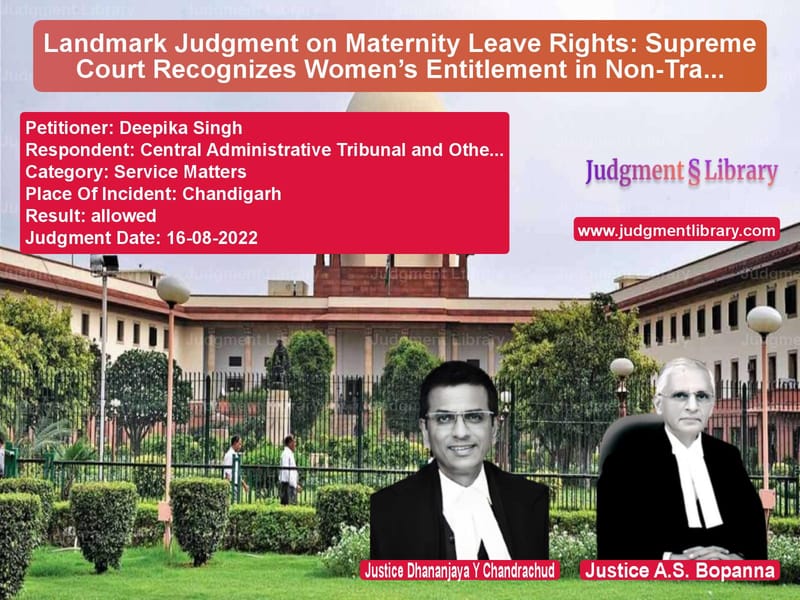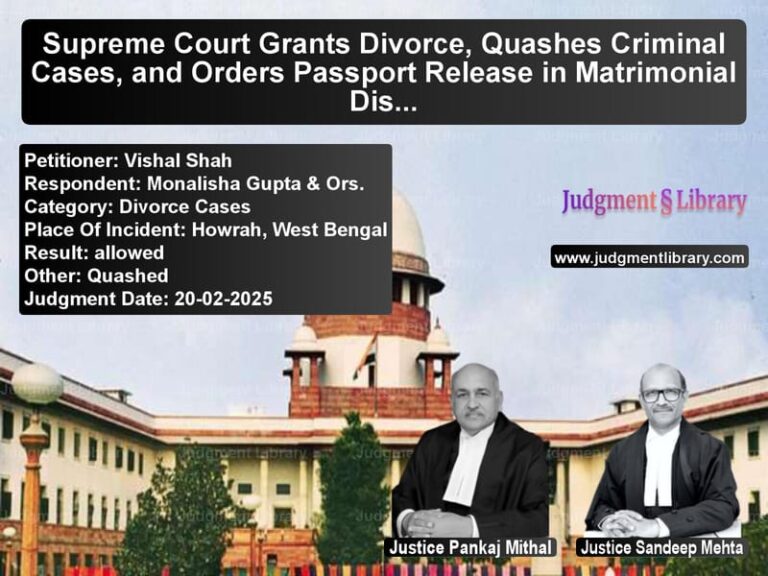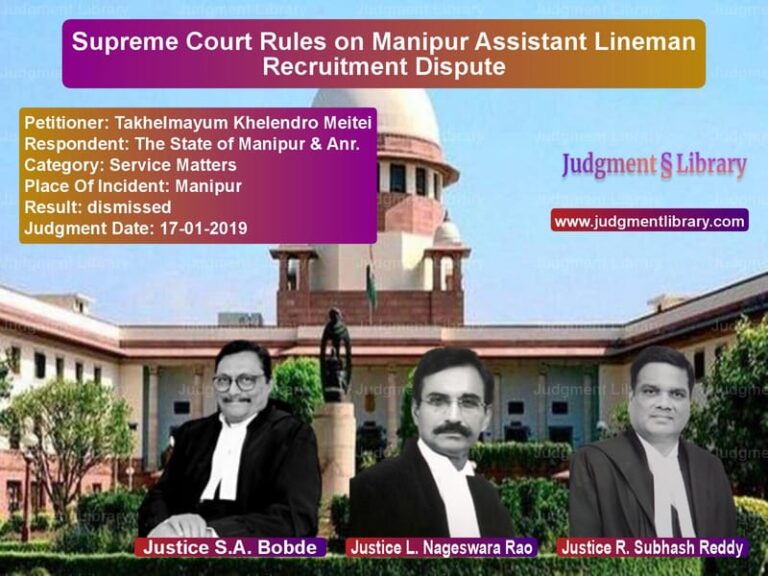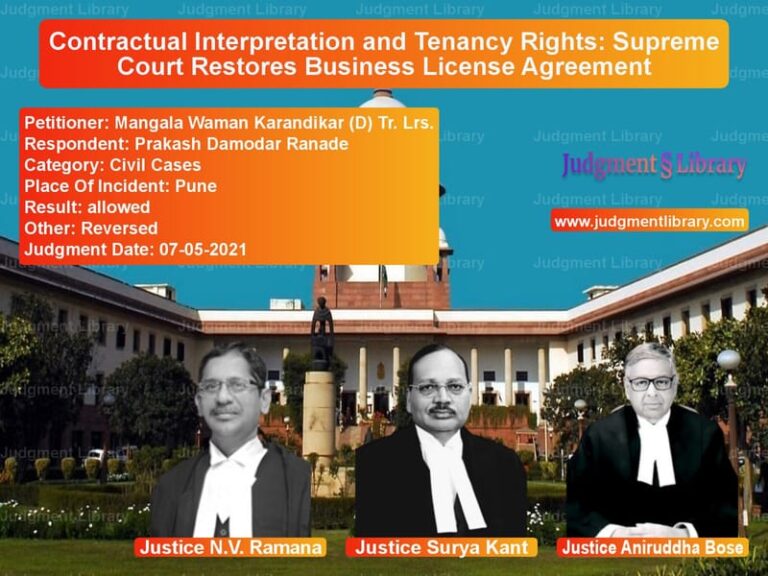Landmark Judgment on Maternity Leave Rights: Supreme Court Recognizes Women’s Entitlement in Non-Traditional Families
The Supreme Court of India, in a landmark judgment in Deepika Singh v. Central Administrative Tribunal & Others, reinforced maternity leave rights for women, particularly those in non-traditional family structures. The ruling, delivered by Dr. Dhananjaya Y Chandrachud and A.S. Bopanna, held that a woman cannot be denied maternity leave for her biological child merely because she has taken child care leave for stepchildren from her spouse’s previous marriage.
This judgment is a progressive step toward ensuring gender justice, highlighting the importance of a purposive interpretation of maternity leave rules. It acknowledges the evolving nature of family structures and establishes a strong precedent for protecting women’s employment rights.
Background of the Case
The case arose when Deepika Singh, a Nursing Officer at the Post Graduate Institute of Medical Education and Research (PGIMER) in Chandigarh, applied for maternity leave following the birth of her first biological child on June 4, 2019. Deepika had married Amir Singh on February 18, 2014, who had two children from his previous marriage. His first wife had passed away in 2013, after which Deepika took on the role of a parent to his children.
Read also: https://judgmentlibrary.com/supreme-court-sets-aside-high-court-judgment-in-sbi-disciplinary-case/
As a stepmother, she had availed child care leave for the upbringing of her husband’s children. However, when she applied for maternity leave under Rule 43 of the Central Civil Services (Leave) Rules, 1972, her request was denied. The authorities reasoned that since she had already taken child care leave for two children, her newborn was considered her third child, making her ineligible for maternity leave under the CCS Leave Rules.
Petitioner’s Arguments
Deepika Singh challenged the rejection of her maternity leave on the following grounds:
- Maternity leave is intended for the recovery and well-being of a mother following childbirth. It should not be denied based on the existence of stepchildren.
- Child care leave and maternity leave serve different purposes. The former allows a parent to take care of children’s needs such as education and sickness, while the latter is specifically meant to support a woman post-pregnancy.
- Rule 43 of the CCS (Leave) Rules, 1972, should be interpreted in a manner that upholds gender justice and supports women’s employment rights.
Respondents’ Arguments
The authorities at PGIMER and the respondents defended their decision, arguing:
- Under Rule 43, maternity leave is only granted if the woman has less than two surviving children.
- Since Deepika Singh had already taken child care leave for two children, her biological child was technically her third child.
- The decision was consistent with the CCS (Leave) Rules and had no exceptions for stepchildren.
Decision of the Central Administrative Tribunal (CAT) and High Court
After the rejection of her maternity leave request, Deepika Singh approached the Central Administrative Tribunal (CAT), which ruled against her. The CAT observed:
“The maternity leave can be granted to a female government servant only if she has less than two surviving children. The applicant has already shown her two children from the first marriage of her husband as her children and has availed benefits for them. Any child born to her now will be considered as a third child.”
Aggrieved by the CAT’s decision, Deepika Singh approached the Punjab and Haryana High Court. The High Court upheld the tribunal’s ruling, stating:
“Though the petitioner is not the biological mother of the two children from her husband’s first marriage, she is now the mother after marriage. She has availed child care leave for them, and thus, her newborn must be considered a third child.”
Supreme Court’s Key Observations
The Supreme Court took a progressive approach in interpreting Rule 43. It made several critical observations:
- Maternity leave and child care leave are distinct entitlements and should not be conflated.
- The primary objective of maternity leave is to ensure the well-being of the mother and child post-delivery, not to count the total number of children under a woman’s care.
- The rule that maternity leave is not granted if the woman has two or more surviving children applies to her own biological children, not stepchildren.
- Denying maternity leave to a woman solely because she had taken child care leave for stepchildren is discriminatory and against the principles of gender equality.
Supreme Court’s Judgment
The Supreme Court ruled in favor of Deepika Singh and held that:
- She was entitled to maternity leave under Rule 43.
- The denial of maternity leave was contrary to the objectives of the law.
- PGIMER was directed to grant her maternity leave and release all admissible benefits within two months.
Impact of the Judgment
The ruling has far-reaching implications for women’s rights and employment policies:
- It ensures that stepchildren do not impact a woman’s entitlement to maternity leave for her biological child.
- It strengthens legal interpretations that support gender justice and equal employment rights.
- It acknowledges that family structures have evolved beyond traditional definitions and adapts legal protections accordingly.
- It reinforces that laws related to maternity benefits must be read in a manner that promotes social justice and inclusivity.
Conclusion
The Supreme Court’s decision in this case sets a strong precedent for women’s employment rights in India. By recognizing that maternity leave should not be denied based on stepchildren, the ruling ensures greater protection for working women in non-traditional family structures. This progressive interpretation of the law paves the way for a more equitable and inclusive work environment.
Moving forward, organizations and government authorities must implement this ruling in their policies, ensuring that all women—irrespective of their family circumstances—receive the maternity benefits they are entitled to. The judgment serves as a crucial step in bridging legal gaps and strengthening women’s rights in India.
Petitioner Name: Deepika Singh.Respondent Name: Central Administrative Tribunal and Others.Judgment By: Justice Dhananjaya Y Chandrachud, Justice A.S. Bopanna.Place Of Incident: Chandigarh.Judgment Date: 16-08-2022.
Don’t miss out on the full details! Download the complete judgment in PDF format below and gain valuable insights instantly!
Download Judgment: deepika-singh-vs-central-administrati-supreme-court-of-india-judgment-dated-16-08-2022.pdf
Directly Download Judgment: Directly download this Judgment
See all petitions in Pension and Gratuity
See all petitions in Employment Disputes
See all petitions in Judgment by Dhananjaya Y Chandrachud
See all petitions in Judgment by A. S. Bopanna
See all petitions in allowed
See all petitions in supreme court of India judgments August 2022
See all petitions in 2022 judgments
See all posts in Service Matters Category
See all allowed petitions in Service Matters Category
See all Dismissed petitions in Service Matters Category
See all partially allowed petitions in Service Matters Category







